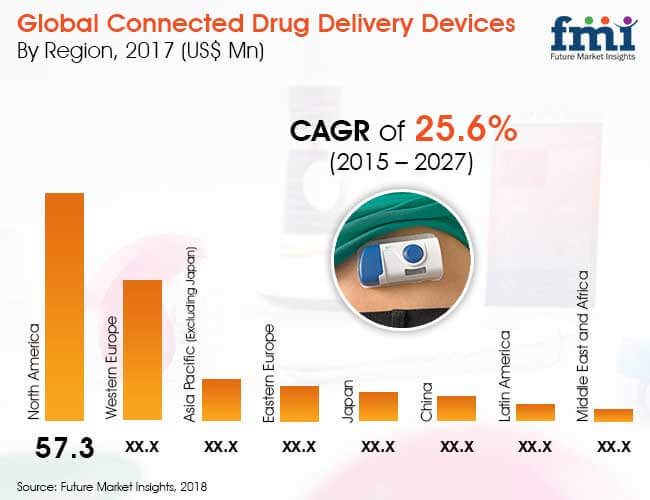
Connected Drug Delivery Devices Market to Reach US$ 1 Billion by 2027 Globally | CAGR: 25.6% | Future Market Insights
The market for connected drug delivery devices is foreseen to witness a stellar growth rate of 25.6% from 2015 to 2027 rising to a valuation of US$ 1,304.7 Mn from US$ 132.2 Mn in 2017. According to the analyst of Future Market Insights (FMI), the leading manufacturers of connected drug delivery devices are focusing collaboration with the software companies to assess the cloud data system in their devices. Moreover, it helps the manufacturer to launch the product more conveniently and to enhance their distribution channel. Manufacturers of inhalers to treat asthma and chronic lung disease are racing to develop a new generation of smart devices with sensors to monitor if patients are using their puffers properly. The companies operating in the global connected drug delivery devices market are OPKO Health Inc., Bayer AG, 3M Company, West Pharmaceutical Services, Inc., and Teva Pharmaceutical Industries Ltd., among others.
Rapidly evolving technologies, for instance, cloud-based computing models, are enabling the healthcare industry towards a transition to a new architecture. Cloud technology along with advances in mobility and telepresence solutions is expected to create new unwired business models capable of providing healthcare anywhere. The use of cloud technology will increase, aided by the proliferation of mobile health applications to collect and send vital signs from wireless and wired remote patient and personal health monitoring devices. Cloud-based platforms and new IT service models will fundamentally change the healthcare business equations and create opportunities for new players to enter the industry.
Get Report Sample @ https://www.futuremarketinsights.com/reports/sample/rep-gb-2755
Growing Demand for Injectable Drug Delivery to Aid Market Growth
The rising preference for injectable drug delivery is anticipated to drive the market for sterile drugs globally. Self-administration of drugs through usage of pre-filled syringes is one of the ways that can help patients to save the fees given to a caregiver. There is an increased demand for large molecule drugs in pre-filled syringes as compared to small molecule drugs in pre-filled syringes.

Following this opportunity, the manufacturers are expected to cash in on profits through introduction of smart injectable drug delivery mediums among their portfolio. The progress is expected to be more prominent in the allergic reactions (Anaphylaxis) indication segment. Further, an upsurge in the number of large molecule drugs that need to be manufactured in injectable format is expected to fuel the growth of the market. Likewise, data generated by bioavailability studies is proving to present a definitive relation between pharmacodynamics and pharmacokinetics for such sterile drugs, which is also expected to offer support to the growth of the market.
Any Queries, ask an Expert @ https://www.futuremarketinsights.com/ask-question/rep-gb-2755
Mobile applications are also being used for the treatment of patients suffering from Alzheimer, Diabetes, COPD or Asthma. Mobile applications with the use of GPS help to track the patient location. If the patient is travelling away from the home, the caretaker can track the exact location of the patient and also track the consumption of dosage by using mobile application. Most of these applications have been developed for the cloud. Placing the wireless solution on a cloud storage system helps with connectivity issues and makes it easier to communicate across different information regimes.
Limited Knowledge and Adoption Rate among Patients to Hinder Growth Rate
The deployment of connected drug delivery devices is not yet widely promoted within the public health system. This is attributed to the high cost of the product, limited reimbursement, and dearth of awareness among the patients regarding the technology. Moreover, complexity and limited availability of the device further reduces penetration. For instance, interpretation of insulin delivery trend for analysis, is considered to be useful however, because of the complicated user interface, the patients cannot interpret them smoothly. As per the current scenario, such obstacles might directly have an adverse effect on the overall growth of the connected drug delivery devices market.
Key Segments
End User
- Hospitals
- Clinics
- Home Care
Product Type
- Inhalation Devices
- Injectable Devices
- Handheld Injectable Devices
- Wearable Injectable Devices
Technology
- Bluetooth
- Near Field Communication
Application
- Anaphylaxis
- Cardiovascular
- Diabetes
- Hormone Replacement
- Others
Get Report TOC @ https://www.futuremarketinsights.com/reports/connected-drug-delivery-devices-market/table-of-content
About FMI
Future Market Insights (FMI) is a leading provider of market intelligence and consulting services, serving clients in over 150 countries. FMI is headquartered in Dubai, the global financial capital, and has delivery centers in the U.S. and India. FMI’s latest market research reports and industry analysis help businesses navigate challenges and make critical decisions with confidence and clarity amidst breakneck competition. Our customized and syndicated market research reports deliver actionable insights that drive sustainable growth. A team of expert-led analysts at FMI continuously tracks emerging trends and events in a broad range of industries to ensure that our clients prepare for the evolving needs of their consumers.
Contact
Unit No: AU-01-H Gold Tower (AU), Plot No: JLT-PH1-I3A,
Jumeirah Lakes Towers, Dubai,
United Arab Emirates
MARKET ACCESS DMCC Initiative
For Sales Enquiries: sales@futuremarketinsights.com
For Media Enquiries: press@futuremarketinsights.com
Editor Details
-
Company:
- MARKITWIRED
- Website:
